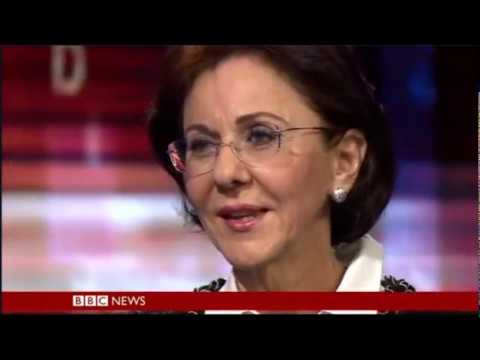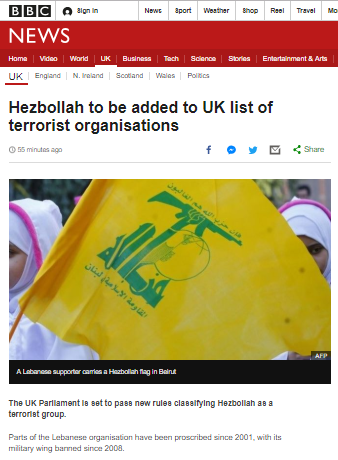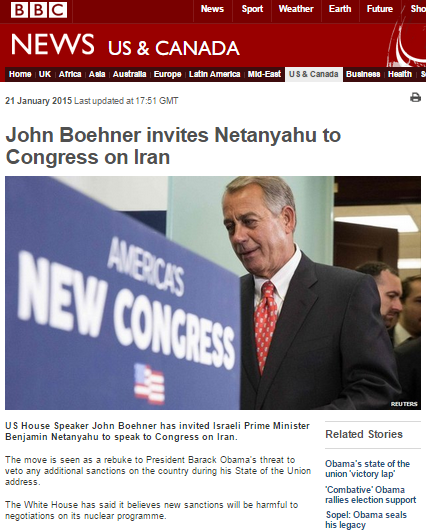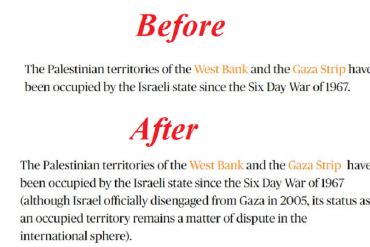The April 17th edition of the BBC programme ‘Hardtalk‘ was devoted to an interview with Rima Khalaf – the former head of UN ESCWA.
The programme was broadcast on BBC television channels (available to UK-based readers on iPlayer here) and a clip from the filmed version was promoted on the BBC World News website under the title “Non-Jewish Israelis ‘cannot challenge’ their status”.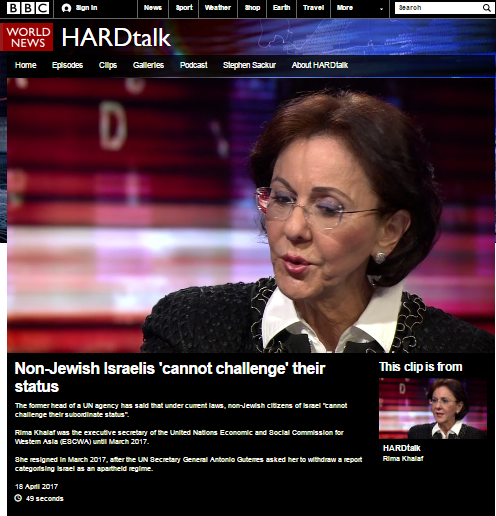
“The former head of a UN agency has said that under current laws, non-Jewish citizens of Israel “cannot challenge their subordinate status”.
Rima Khalaf was the executive secretary of the United Nations Economic and Social Commission for Western Asia (ESCWA) until March 2017.
She resigned in March 2017, after the UN Secretary General Antonio Guterres asked her to withdraw a report categorising Israel as an apartheid regime.”
An audio version of the interview was also broadcast on BBC World Service radio.
“Why did a UN agency publish a report that categorised Israel as an apartheid state? Rima Khalaf was Executive Secretary of the United Nations Economic and Social Commission for Western Asia until March 2017. She commissioned a report which accused Israel of systematically implementing apartheid policies and promptly resigned from her UN post when the Secretary General refused to accept the work. What were her motives?”
Audiences certainly did not hear an honest account from Khalaf of her own motives or those of the member states of the UN agency she headed. They did however hear presenter Stephen Sackur challenge her robustly on that topic as well as on the issue of the controversial choice of authors for the report and on the use of the term ‘apartheid’ in connection with Israel.
However, Sackur was apparently less able or willing to challenge the numerous falsehoods promoted by Khalaf throughout the interview, with the result that audiences were highly likely to go away with numerous inaccurate impressions.
On more than one occasion Khalaf brought up the subject of the legal system in Judea & Samaria.
“I mean in the West Bank you have a dual legal system; one that applies to Jewish settlers and one that applies to the Palestinian inhabitants of the occupied territory.”
“When Richard Falk said that there is a dual legal system applied in the West Bank, there is a dual legal system.”
“…the apartheid problem emerges not from the occupation but from the fact that you have two populations on the same land and you have two different laws applying to the two populations.”
Audiences were not informed that the legal system that exists does so because Israel has not annexed the area and that certain elements of that legal system – e.g. Ottoman law (1517-1917), which regulates property and lands; British law (1917-1948), which regulates defense; Jordanian law (1948-1967), which regulates planning, construction and parts of the penal code – pre-date Israeli control over the territory. Neither were they informed that the vast majority of Palestinians – who reside in Areas A and B – are subject to the legal system of the Palestinian National Authority under the terms of the Oslo Accords.
Khalaf’s false claim that Israel “sends” civilians to live in Judea & Samaria was not challenged.
“…this is a case where Israel sends its population to settle in the West Bank, to colonise the West Bank…”
Khalaf’s false claims concerning the rights of Israeli citizens were not challenged at all.
“… in Israel there is a differentiation between nationality and citizenship – and this is very strange by the way – and that you have to be a Jew in order to be a national. And there are lots of rights that are associated with nationality. So you can be a citizen but you cannot have those other rights. And this is extremely important. You cannot discriminate between your citizens.”
Likewise, her misrepresentation of land related issues – further amplified in the promoted clip – went unchallenged.
“In Israel, I’m sure you know that 93% of the land is owned by the state. And land laws allow agencies to develop and sell land to Jews only. So you talked about 20% of the population who are non-Jewish; fine. But they’re not allowed to buy land in Israel except the lands that stayed with them after Israel was established…”
While it is true that the Israel Land Administration does administer around 93% of the land, it is not true that land is only sold to Jews – as explained in this backgrounder produced by CAMERA.
“In 1960 under Basic Law: Israel Lands, JNF-owned land and government-owned land were together defined as “Israel lands,” and the principle was laid down that such land would be leased rather than sold. The JNF retained ownership of its land, but administrative responsibility for the JNF land, and also for government-owned land, passed to a newly created agency called the Israel Land Administration or ILA.
Today, of the total land in Israel, 79.5% is owned by the government, 14% is privately owned by the JNF, and the rest, around 6.5%, is evenly divided between private Arab and Jewish owners. Thus, the ILA administers 93.5% of the land in Israel.
Statements that Israel refuses to sell state-owned land to Israeli Arabs are extremely misleading, since, as stated above, such land is not sold to Israeli Jews either, but is instead leased out by the ILA and is equally available to all citizens of Israel.”
Khalaf also misled audiences – unhindered – on the topic of political parties and that misinformation was further amplified in the promoted clip from the programme.
“But you mentioned also political parties. Do you know that it is unlawful in Israel to establish a political party that questions the nature of the state as a Jewish state. So basically you’re telling the non-Jewish citizens of Israel you can vote but once you’re elected you cannot…you cannot question your subordinate status. OK; you can lobby for better budgets, for municipal services, for better health and better education. But the basic laws that discriminate against you and that establishes [sic] inequality are beyond your reach because if you do, you’re illegal as a party.”
In fact, the establishment of such a party is not illegal as Khalaf claims but it might be prevented from running in elections as explained here:
“According to the Basic Law: The Knesset, the Central Elections Committee may prevent a candidates’ list from participating in elections if its objectives or actions, expressly or by implication, include one of the following:
- negation of the existence of the State of Israel as the state of the Jewish people;
- negation of the democratic character of the State;
- incitement to racism.”
That clause was applied in 1988 in the case of the ‘Kach’ party. In contrast to the impression given by Khalaf, the anti-Zionist party Balad has been continuously represented in the Knesset since 1996 and one would of course expect a seasoned interviewer such as Stephen Sackur to know that and to ensure that audiences were provided with that information.
Khalaf invoked UN GA resolution 181 but the fact that the Arab states rejected that recommendation was not clarified to BBC audiences.
“I suggest you and probably the audience they go back to the UN resolution that establishes Israel: the Partition resolution. That resolution was very clear: there is a Jewish state and there is an Arab state. But neither of the two states – neither the Jewish state nor the Arab state – can have laws that discriminate between people based on religion, sex or race. So that was the condition for establishing the state. Actually the declaration of independence for Israel does not discriminate based on any of those factors. But then later on, laws that discriminate based on religion and ethnic origin crept into the legal structure of Israel.”
Khalaf’s suggestion that peace in the Middle East depends on Israel was not questioned and her deliberate misrepresentation of the words of the Israeli prime minister was not challenged or clarified.
“What I am saying is, if we want peace in the region, we really need to address those laws, particularly now that we’re talking about recognising Israel as a Jewish state. My reference is the prime minister of Israel. When asked what do you mean by a Jewish state, his response was a state for the Jewish people and for the Jewish people only.”
In fact, while referring in 2014 to a proposed bill, Netanyahu said:
“The State of Israel provides full equal rights, individual rights, to all its citizens, but it is the nation-state of one people only – the Jewish people – and of no other people. And therefore, in order to bolster the status of the State of Israel as the nation-state of the Jewish people, I intend to submit a basic law that will anchor this status. The new law will be formulated in dialogue with all components of the coalition so that the values of the State of Israel as a Jewish and democratic state are preserved.”
Sackur made no comment when Khalaf invoked the Livingstone Formulation.
“Look, and I know that there are lots of laws where criticising Israel will lead to defamation and to labelling you as an antisemite….”
Moreover, Sackur himself contributed to the misinformation relayed to audiences in this interview by referring to “roads that are specifically for Jewish settlers”.
Sackur [13:21]: “Of course the Israelis say that so many of the conditions they impose on Palestinians in the occupied territories in the West Bank are connected to security. It is security, they say, that led them to build that barrier fence or wall – whatever you choose to call it. It is security that leads them to have roads that are specifically for Jewish settlers to get them safely to their settlements. And that is not about a racial theory; that is about the practicalities of security.” [emphasis added]
Such roads of course do not exist: while vehicles with PA plates have been restricted from travelling on a small number of roads (a total of 40.22 kms according to B’Tselem) in Judea & Samaria for security reasons, non-Jewish Israelis and tourists were always free to use them. CAMERA has secured numerous corrections in the past from media outlets that have promoted the same falsehood.
Stephen Sackur’s robust questioning on the topic of the intentions behind the ESCWA report, its author and the use of the ‘apartheid’ smear was a refreshing novelty on ‘Hardtalk’ and particularly important seeing as previous BBC coverage of the story (see ‘related articles’ below) refrained from addressing those issues. Unfortunately, his failure to challenge Rima Khalaf’s misleading claims equally robustly and his own promotion of inaccurate information detracted from the interview and made it highly likely that uninformed members of the public would go away with multiple misconceptions.
Related Articles:
BBC News erases identity of authors of UN ‘apartheid’ report

